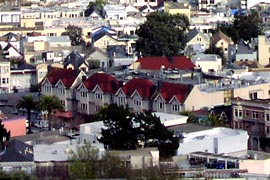California Environmental Quality Act Saved
In August 2012, state Senate leader Darrell Steinberg
(D-Sacramento) launched a cynical attack on the
California Environmental Quality Act (CEQA) to help
large corporations and real estate developers skirt
state environmental requirements. Steinberg dressed up
his attack as an attempt to 'reform' and 'streamline'
the law.
In our cities, CEQA gives residents the power to challenge bad real estate development, such as the 8 Washington "Wall On The Waterfront" project that San Francisco voters wisely rejected in November 2013.
Steinberg's 'reforms' would have shortened reporting and appeal timelines in order to avoid public scrutiny, and would have exempted many projects from any reporting at all. The public would have been far less informed, and would have had less warning, time, and legal standing to challenge projects that are environmentally questionable.
Thankfully, a statewide coalition of over 150 organizations (including Our City) joined together to challenge Steinberg, and his move against CEQA was thwarted.
SF Supervisor Scott Wiener Follows With Local Attack On CEQA
However, just three months after this rejection of the state assault on CEQA, then San Francisco District 8 Supervisor Scott Wiener (who has received large donations from real estate developer interests) launched a similar attack on local San Francisco CEQA protections.
Wiener's legislation would have minimized environmental reporting, shortened timelines for appealing environmental approvals, placed onerous filing requirements on citizen CEQA appeals, made it harder to prove environmental harms, and exempted San Francisco's Board of Supervisors from ever again hearing CEQA challenges as a full 11 member formal judicial body (instead letting 3 member committees informally consider appeals as mere public complaints).
Our City Forges Strong Coalition To Challenge Wiener On CEQA
Our City, having fought in 2010 against a previous local attack on CEQA, took the lead to organize a new coalition to challenge Wiener's legislation.
Eventually this coalition numbered 42 San Francisco environmental, social justice, park protection, historic preservation, neighborhood, and labor organizations, and included scores of individual citizen activists from all across the political spectrum.
Together we became a formidable force in City Hall and ended up dramatically rewriting Wiener's legislation, transforming it into a measure to strengthen, rather than weaken, local CEQA protections.
Coalition Wins Dramatic Rewrite To Improve Environmental Procedures
The coalition worked with its team of dedicated volunteer attorneys and District 6 Supervisor Jane Kim to replace Wiener's legislation with a substitute that not only stripped it of nearly all of its problem text, but also greatly expanded environmental reporting to the public, especially for cases in which projects dramatically change after their initial environmental approvals.
In the end, the attempt to weaken local CEQA protections was turned on its head to form new reporting procedures that are dramatically stronger and more protective than the previous law.
Improved Environmental Review Passes Unanimously
In return for these greatly improved public notice requirements, the coalition accepted one compromise, allowing challenges of environmental approvals to be completed earlier in the project development process. The final text of this vastly improved law was passed unanimously by the Board of Supervisors, and went into effect on October 7, 2013.
Scott Wiener Goes To Sacramento With His 'Reforms'
Our local environmental victory sets a precedent for the state legislature, where Scott Wiener, now as our state Senator, is again seeking to 'streamline' CEQA in the current legislative session. Advocates can now point to San Francisco's new law as a model for legitimate CEQA improvements, and for opposing any more 'streamlining' at the local or state level.
